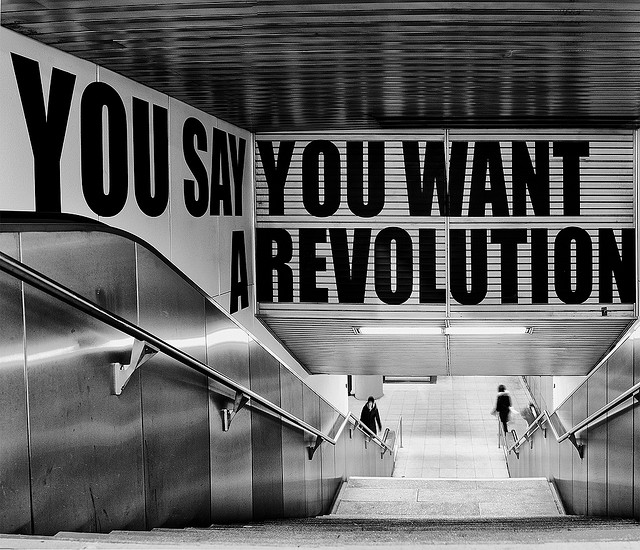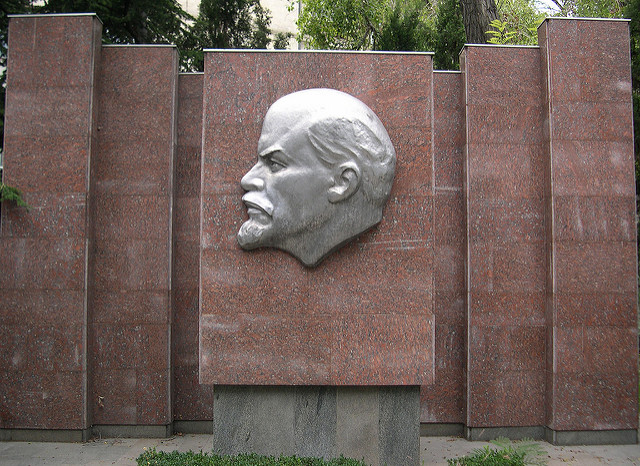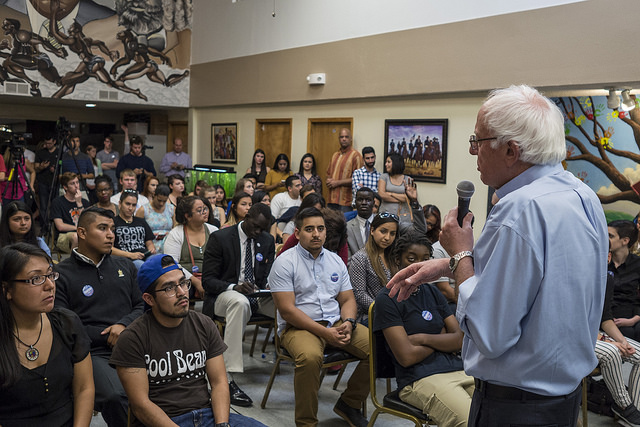At a fundamental level, there is something very attractive about the writings of Murray Bookchin. The work of this often prickly autodidact, who died in 2006, evinces an enduring to commitment to something that might (in the best sense of the word) be termed “humanism.”
His intellectual concerns ranged across the history of Europe and its political movements, touching on the complexities of Marxist theory, the problems (and opportunities) generated by urbanization, and the role of ecology in the politics of the modern Left.
For example, in The Next Revolution, a collection of Bookchin’s writings from the 1990s, we find extensive essays in the craft of direct democracy in the environment of an urbanized mass polity. In these essays, Bookchin seeks to describe a politics beyond the statist centralism characteristic of both late capitalism and state socialism. This certainly an important task and one that has seldom been addressed with sufficient vigor or rigor in the history of leftist theory.
Still, although his project is a crucial one, Bookchin’s conclusions are problematic. This important collection of essays is a start, important but nonetheless preliminary, along the road of a sustainable post-capitalist politics.
Bookchin was born in the Bronx in 1921. He was a product of that eminent productive milieu of eastern European immigrants to New York whose radicalism infused and strengthened the American left for half a century. He was introduced to leftist ideas as a child, first as a member of the Young Pioneers and the Young Communist League, then as a student at the Communist-linked New York Workers School on the Lower East Side. He cut his proletarian teeth as a foundryman in Bayonne, New Jersey where he did organizing work both for the United Electrical Workers and the Socialist Workers Party.
In the 1940s, Bookchin was a relatively orthodox Trotskyist, working as a part of the group that produced the journal Contemporary Issues, which was distinguished by its attachment to the liberating potential of technology. By the 1950s, Bookchin had become a self-described anarchist and had begun to move toward the ecologically tinged libertarian socialism (characterize by some as green anarchism) that would shape his work from the 1960s until his death.
Bookchin was ahead of the curve on a number of issues, the importance of which would only later be grasped by other leftists. In 1962, writing under the pseudonym Louis Herber, Bookchin published Our Synthetic Environment, a book that wedded radical politics and environmentalism months before the topic was broached explosively in Rachel Carson’s Silent Spring. Bookchin also was ahead of many in the old left on recognizing the failure of orthodox Marxisms to adequately address questions of race and gender.

In Post-Scarcity Anarchism (1971), a collection of essays from the 1960s, Bookchin began to imbricate his views on a more inclusive and democratic leftist politics together with his concerns about the environment, and the effects of urbanization on human society, through a variety of monographs, articles, and other publications. Hired to teach at Goddard College in Vermont in 1973, he would take this institutional opportunity to found the Institute for Social Ecology, which would facilitate the development and propagation of his ideas on the interplay of questions of ecology, urbanism and politics. He would pursue the resulting intellectual and organizational agenda for the rest of his life.
Bookchin’s position is difficult to summarize succinctly, and it changed over time. The articles in The Next Revolution represent his most mature position, one taken after the debates with the radical environmentalist movements of the 1980s had prompted him to re-emphasize the human dimension of ecological thinking. Bookchin sought to exorcise the grim consequences of the Left’s commitment to democratic centralism by proposing a politics founded on local, face to face democracy, which he termed “libertarian communalism.”
Bookchin’s ideal, shaped by but not beholden to the history of small scale civic engagement from 5th century Athens through the anarchist communalism of the Spanish Civil War, was a commune of communes, in which politics is divorced from statecraft. This is an appealing idea, one that seems to move progressivism beyond state structures that merely reproduce the repressive qualities of the economic and political orders that they are meant to replace.
In a broader sense, Bookchin’s ideal was one in which a rational appreciation of the necessity of environmental preservation forms a backdrop for a thoroughgoing direct democratic politics. Bookchin deviated from orthodox versions of Marxism in a number of ways, most prominently in his view that hierarchy is prior to economic organization. Thus, for Bookchin, the key issue was to build non-hierarchical political structures rather than to reconfigure the economic order in the first instance.
Key to such non-hierarchical political structures would be the reconfiguration of the city, both politically through the downward devolution of political power, and (concomitantly) the reparsing of modern megacities into smaller, more humanly (and humanistically) proportioned entities. These are goals, the desirability of which is easy to agree on, but they are general. Bookchin argues for them in predominantly general terms. As is so often the case, the devil is in the details.

There are a number of points on which Bookchin’s program can be criticized, some more significant than others. One of these is his appropriation of Marxist theory. Bookchin showed at many points a good fighting familiarity with Marx’s writings, but also had some limitations. At one point in The Next Revolution (and this could stand in for a number of instances throughout his oeuvre) Bookchin writes,
Contrary to Marx’s assertion that a society disappears only when it has exhausted its capacity for new technological developments, capitalism is in a state of permanent technological revolution – sometimes frighteningly so. Marx erred on this score: it will take more than technological stagnation to terminate this system of social relations. [7, note 3]
This statement is problematic for a number of reasons. In the first instance it seems to attribute to Marx a species of technological determinism that he simply did not espouse. More unfortunately, it mischaracterizes Marx’s view of the significance of technology in society and of its role in the destabilization of capitalism.
The statement of Marx’s to which Bookchin refers is the following passage from the preface to A Contribution to the Critique of Political Economy. There Marx wrote,
A social formation never perishes before all the productive forces for which it is sufficient have been developed, and new superior relations of production never replace older ones before the material conditions for their existence have matured within the framework of the old society. Mankind thus inevitably sets itself only such tasks as it is able to solve, since closer examination will always show that the problem itself arises only when the material conditions for its solution are already present or at least in the course of formation.
Productive forces (Produktivkräfte) is by no means synonymous with technology. What is key here is not the extant technologies (or not merely those,) but of the forces of production (of which they are an element,) and the relations of production, in which they are imbricated. This is not mere nitpicking, because technology does play an important role in Marx’s account of the transition from capitalism to a post-capitalist order.

In Volume 3 of Capital, Marx argues that technology, in its role as an element of fixed capital, becomes an ever greater proportion of total capital, progressively displacing variable capital, which, as human labor, is the only source of profit. This is the basic foundation of Marx’s law of the tendency of the rate of profit to fall. It is this tendency which creates conditions of instability in which the contradictions of capitalism can lead to systemic collapse (given the proper formation of proletarian consciousness.)
There are other matters about which one could quibble, particularly from a Marxist perspective. Not least among these is the proposition that hierarchy itself is in some sense prior to class structure. But a more profound, and perhaps less sectarian question, which Bookchin’s work raises, relates to ideology. Specifically, given the economic, social, and political power of owners of capital and their access to the ideological apparatuses of the state, how is it that the transition from resource exploiting capitalism to ecologically informed libertarian municipalism is supposed to be achieved.
Marxists at least have a reasonably well-defined (if not unproblematic) answer to this question. The proletariat, that is the mass of those who do not own the means of production and have only their own labor power to sell, will unite in exploitation driven solidarity to expropriate the owners of capital. What will happen after that is a matter of speculation. Marx never discussed it in concrete terms (outside some very general speculations in The German Ideology and elsewhere).
Given that there was no way of knowing in advance precisely what material conditions would obtain at that point, this is hardly surprising. Marx seemed to view extensive discussions of the post-revolutionary order as mere utopian speculation. This had the unfortunate consequence of allowing subsequent appropriators of his thought a free hand in defining precisely what a “dictatorship of the proletariat” would entail, opening by omission the way to instances of terror that were clearly out of line with the spirit of Marx’s project.
Bookchin is much more explicit about the sort of order he sees replacing capitalism, and he is at least clear about what political approaches he is skeptical. On numerous occasions, he adverts to the futility of simply electing properly oriented politicians to serve in an improperly ordered state structure. But what is the alternative?
Bookchin is dubious about the efficacy of class consciousness, and similarly suspicious of identity politics. The question then is: what is the basis of solidarity on which a movement could be built such as would have any prospect of dislodging the hold of capital on the social order? Bookchin never provides a particularly satisfactory answer to this question, either in the essays in The Next Revolution or in his other published writings. He seems to view the process of transition as gradual, and cautions his readers not to expect rapid transformation.
“We will not,” Bookchin wrote in 1998, “create a libertarian municipalist society overnight, and in this era of counterrevolution, we must be prepared to endure more failures than successes. Patience and commitment are traits that revolutionaries of the past cultivated assiduously; alas, today, in our fast consumerist society, the demand for immediate gratification, for fast food and fast living, inculcates a demand for fast politics.” Fair enough. But having elucidated a number of the compelling ideological problems of the struggle, Bookchin leaves his reader with few tools for resolving them.
Bookchin was an avid and perceptive reader both of current events and of the history of radical liberationist movements. He wrote extensively on both, and his writings are filled with evocations of the actions of the Communidades de Castile, the Parisian sections, the Communards, even Occupy, in some of his last writings.
Yet, although one can derive hope from these instances that it is possible to resist the power of capital, it is nonetheless also the case that all of these allusions do not add up in the final analysis to a theory of revolution. Bookchin’s vision seems to have much in common with the British Fabians (although he clearly views himself as operating at a more radical level than they) in the sense that the overcoming of capital would be a long process of rational persuasion. Bookchin is firmly and repeatedly critical of Marx’s attribution of revolutionary agency to the proletariat.
Yet Bookchin seems also to believe, and in part to base his rejection of this agency, on the proposition that the proletariat has ceased to exist. Perhaps a more nuanced understanding of the class structure of capitalism might have made clear the off-shoring of violent exploitation and the persistence of a broad strata of American society who combine some of the trappings of bourgeois existence (in the form of consumer electronics), while still having nothing but their labor power to offer on the altar of capital.
Most likely, the answer is Bookchin’s persistent and undimmed faith in the power of reason to promote humane values. Reading his essays, one is left with the powerful impression that if only human beings could be provided with the rational bases for a libertarian municipalist society, that their rational capacities would see them through the process of its creation. This may seem rather thin, but revolutionary change requires an element of optimism, and with this, Bookchin is well-endowed.
For all its problems, Bookchin’s work is still very much worth reading. His is a humanistic voice, one that at points provides a very attractive model of which human life could be, were it lived under different political conditions and at a more appropriate scale. His essays provide useful exercises in imagining a post-capitalist society. If Bookchin lacks a clear map of how to get there, he nonetheless provides an attractive account of how a society in which a right life could be lived.
Photographs courtesy of tetdelacourse, jaumescar, Grant Neufeld, and Gigi Ibrahim. Published under a Creative Commons license.





